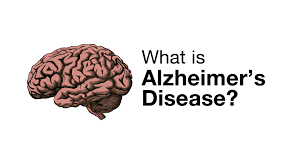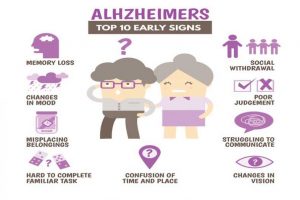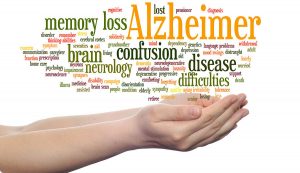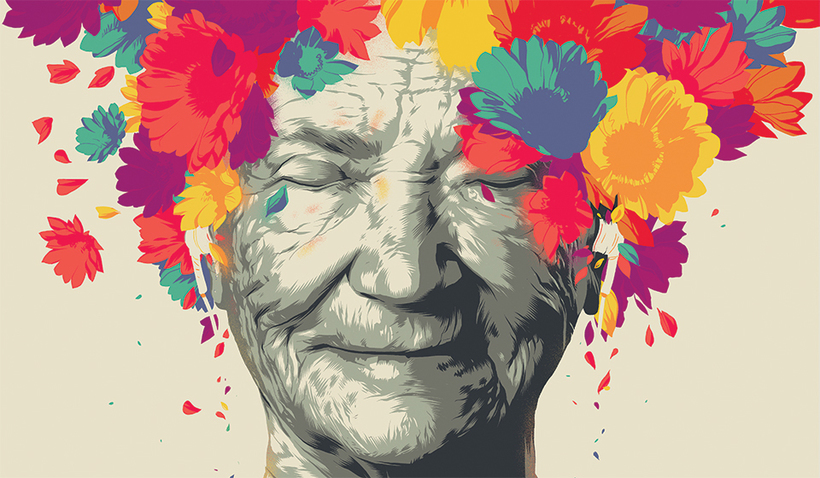Every month is dedicated to a health issue that affects most people in the world. Though some are remembered by country, there are others that are remembered worldwide. In the UK, awareness is raised around Alzheimer’s in September whereas in the US, November is dedicated to Alzheimer’s Disease and so this article is all about Alzheimer’s!

What is Alzheimer’s?
Alzheimer’s is a chronic neurodegenerative disease that usually starts slowly and worsens over time. The early symptoms start with short-term memory loss and gradually worsen to problems with language and behavioral issues. It is important to know that not everyone experiences the same symptoms, and the disease can progress at a different rate for each individual. There are three, five or seven stages of Alzheimer’s.
Signs, Symptoms, and Stages

The damage occurring in the brain of someone with Alzheimer’s disease begins to show itself in very early stages. The signs of an early-onset Alzheimer’s patient begins to appear for a person who is between the 30s and mid-60s. The first symptoms of Alzheimer’s vary from person to person and memory problems are typically the first to be detected. Alzheimer’s disease progresses in several stages: preclinical, mild (often referred to as early stage), moderate, severe (referred to as late-stage).
To be noted that the first three stages of the seven-stage model does not apply to an individual who has dementia.
• Stage 1 – No Cognitive Decline. In this stage, a person with Alzheimer’s disease has no memory loss and no obvious symptoms of dementia. Alzheimer’s disease is undetectable at this stage.
• Stage 2 – Very Mild Cognitive Decline. An Alzheimer’s patient begins to experience normal forgetfulness that is often associated with aging. These symptoms are not exactly noticed by the individual’s family members or doctor.
• Stage Three – Mild Cognitive Decline. The increased forgetfulness and decreased performance are likely to be noticed by the person’s family. The patient might struggle to talk or know where they are.
In these three above stages, the patient is not considered as a dementia patient.
• Stage Four – Moderate Cognitive Decline. This stage is described as an early stage of dementia. A person in this stage will experience increased forgetfulness, often forgetting recent events, as well as difficulty in concentrating and managing finances. They may not be allowed to travel to unfamiliar areas alone. The average duration of a stage four is approximately two years.
Mid-Stage Dementia is the stage five that continues in stage six.
• Stage Five – Moderately Severe Cognitive Decline. People at this stage may require assistance with activities of daily living. They may also forget their address or phone numbers. The patient is also unable to identify where they are or the time of the day. The average time a stage five lasts is one and a half years.
• Stage Six – Severe Cognitive Decline. Also known as Middle Dementia, stage six is the period during which a person requires assistance to carry out day to day activities. They tend to forget their close friends or family’s name. Patients in this stage have memories of their early lives.
• Stage Nine – Late Stage Dementia. Very Severe Cognitive Decline. Stage seven is the final stage in the progression of Alzheimer’s disease. Patients in this stage require constant assistance with most of their activities. This stage lasts an average of two and a half years.
The Diagnosis

As of today, there’s no specific test that confirms you have Alzheimer’s disease. The medical expert will diagnose the disease through the symptoms based on the information you provide and the results of various tests that can help clarify the diagnosis. Your doctor can always determine whether you have dementia and eventually determine Alzheimer’s.
To help distinguish Alzheimer’s from other cause of memory loss, doctors now rely on these tests:
• Physical and neurological exam– the doctor will check your reflexes, muscle tone, strength, sense of hearing and seeing, coordination and balance.
• Lab tests– Blood tests help in ruling out the other potential causes of memory loss and confusion, such as thyroid disorders and vitamin deficiencies.
• Mental status and neuropsychological testing– a brief mental test is conducted to assess your memory and other thinking skills. A more extensive assessment of your thinking and memory might be held.
• Brain imaging – these are used to pinpoint the visible abnormalities related to conditions other than Alzheimer’s disease such as strokes, trauma or tumors. Brain imaging technologies include magnetic resonance imaging(MRI), Computerized tomography(CT), Positron emission tomography (PET), and Cerebrospinal fluid.
Doctors and other medical experts are working on developing new diagnostic tools to help identify Alzheimer’s. Hopefully, in the future, we will be able to have a different approach to brain imaging, more-sensitive tests of mental abilities and test the right biomarkers in blood and spinal fluid.
Treatment
Though there is no known cure for Alzheimer’s as the death of brain cells cannot be reversed, therapeutic interventions can make it easier for people to live with the disease. According to the Alzheimer’s Association, the important elements of dementia care involves effective management of any conditions occurring alongside Alzheimer’s, activities and day-care programs and involvement of support groups and services. Doctors are the best to consult before you take any decision of consuming any medication.



